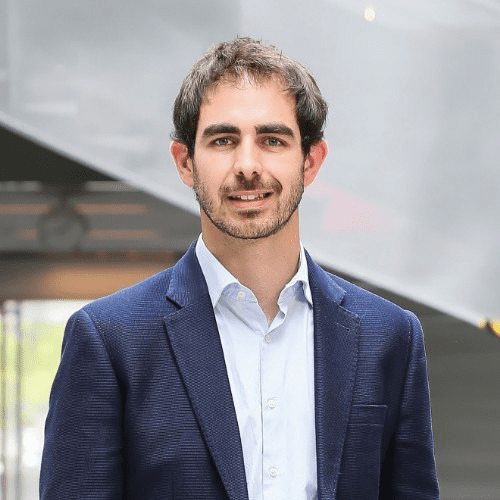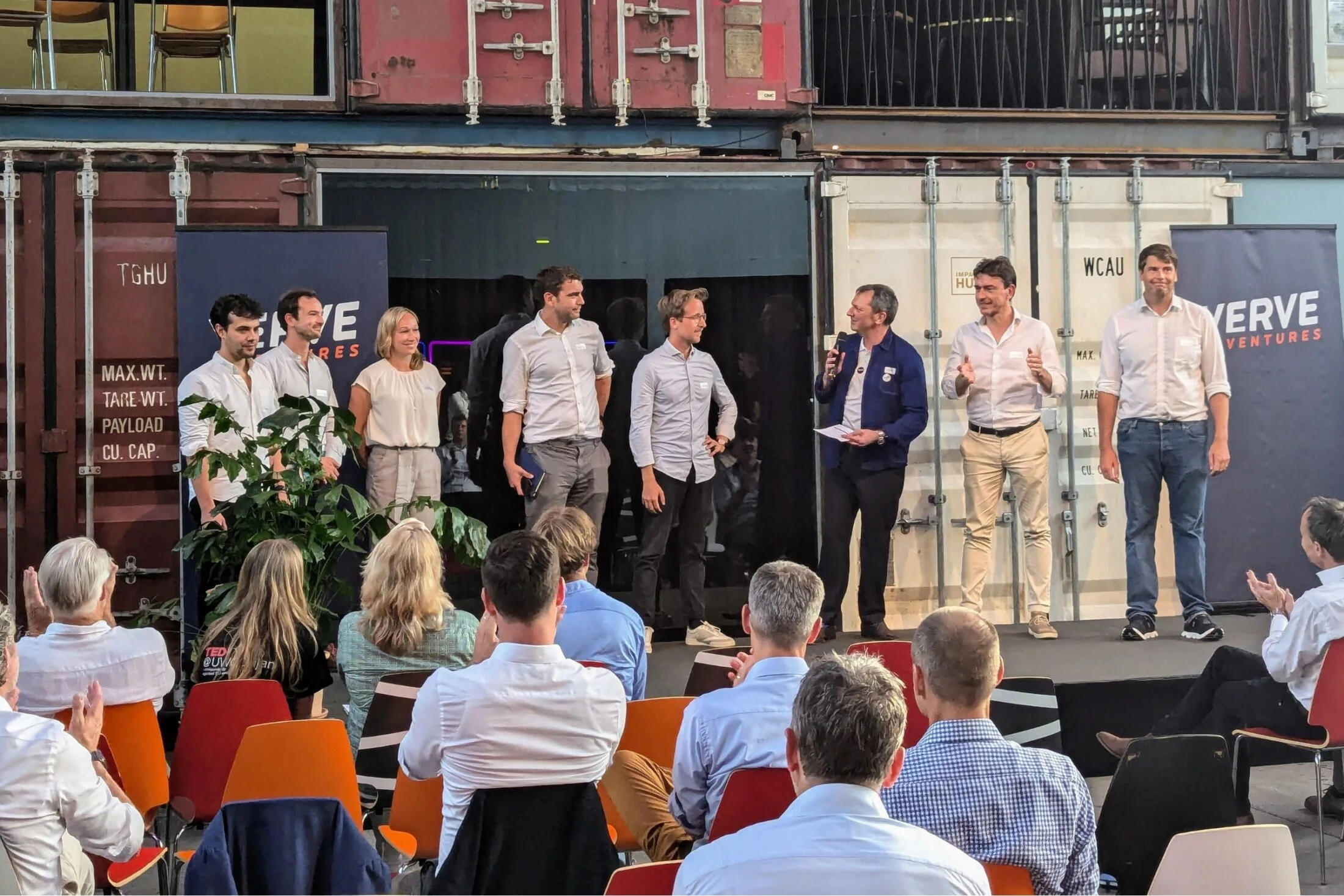In our new series of articles, we shine a light on the achievements of startups and the lessons learned that can be beneficial for others. We talked with Carlos Ciller, co-founder of Ikerian, about the challenges the startup faced when it entered into a cooperation with Novartis.

Co-founder and CEO of Ikerian
Ikerian is an Artificial Intelligence startup based in Bern that has developed a software tool to generate and organize insights and knowledge in eye care. Verve Ventures has invested in Ikerian’s seed funding round in 2019. Carlos has a Ph.D. in machine learning and Medical imaging in Ophthalmology from the University of Lausanne.
In December 2020, Ikerian announced a multi-year partnership with Novartis. Ikerian will provide its CE-marked web-based software platform, RetinAI Discovery, to support multiple projects focusing on digital innovation in eye care. Carlos, what is the goal of this partnership?
We signed a multi-year collaboration with Novartis that allows us to provide our AI software solutions and digital tools to Novartis’ in multiple geographies. We have effectively become a preferred supplier of the firm, and this agreement makes it much faster and easier to work with Novartis on projects at global scale.
Why would Novartis enter such a collaboration with a startup that has only around 20 employees?
Ikerian is positioned at the intersection of artificial intelligence, software, and healthcare. We build software that allows our clients to organize, structure, and analyze data that comes in all shapes and sizes, which is often generated in a clinic. Our starting point was eye care, but now we can more easily branch out to other fields such as neuro-ophthalmology, neurodegenerative disorders, or oncology. The value we provide to a pharma company is at three levels. In research, our product allows for identifying multi-modal biomarkers faster. In the clinical development stage, our solution aggregates data, speeding up decision-making and operations like clinical trials. This decreases time-to-market and provides a very attractive return on investment for customers. Lastly, we’re supporting the development of digital pharmacotherapies combining AI digital components with specific treatment regimes, moving one step closer to patient-specific medicine in ophthalmology. Very few companies can provide this kind of value, and unsurprisingly, many pharma companies have reached out to us.
How many of these benefits did you actually know you could provide before the discussions with Novartis, and which ones only came up during the process?
For us, this agreement is the realization of a vision, namely, to use our technology to benefit patients. The majority of the ideas, say 70%, were clear to us from the start, and the rest came from interactions with our pharmaceutical customers and physicians.
B2B sales cycles are notoriously very long, but it’s not just that B2B contracts can be lucrative. If you are smart about it, you can and you should also learn a lot from your clients. Ultimately, it needs to be a win-win situation for all the parties.
What is the background story of the collaboration agreement, how did your relationship with Novartis start?
It all started with a pilot project around two years ago. The objective of this pilot for Novartis was to decide if they wanted to use our technology. They were convinced by our attention to detail during the collaboration and also, of course, because we enabled users to do things that weren’t possible before. For us, this meant that we really had to deliver and rapidly solve any issues that could come up during the trial period.
How did the pilot come about?
Novartis is always screening for companies and partners, and since we were geographically close, they found us and reached out to us. If a big company lends you a hand, you must be very reactive as a startup to make it work. Honestly, at that stage, it was 2017-2018, we were still building the technology. It became clear during the early discussions that customers don’t care so much about the technology per se but rather about our actual capabilities to deliver solutions. Customers want a product that solves one or more of their problems. We didn’t have a 100% perfect product at that time, but we knew that we could refine it, so we offered it to customers. It was a leap of faith, but we took it because we knew the team could deliver.
“This was a perfect example of how you could activate your big network of experts because you knew about the challenge we had.”
Who helped you to win the collaboration agreement?
Outside Sandro and Stefanos, my co-founders, and the members of the team, two persons were instrumental in the process. First is Dr. Markus Ewert, who is our chairman of the board of directors. He’s very experienced in B2B deals after more than 30 years in this field and was a big help in establishing the partnership. In the negotiation phase, we were supported by an exceptional lawyer with the track record to understand how a big pharma firm works, which makes a big difference. Urs Briner, from Verve Ventures, introduced me to her in one of my monthly checkpoint meetings with Verve Ventures’ portfolio success team. This was a perfect example of how you could activate your big network of experts because you knew about the challenge we had.
On a very practical level, how do you identify the right department and right person to talk to in a company with 110’000 employees so that you don’t have to fumble your way through the corporation and lose too much time?
The way you do it is by building relationships to assist your customers to convince them of your solution. You do this by providing them with the right information, tools and material and by being helpful to them. At first, we met just a few people at a time, the rounds got larger over time. Now we’re connected with people in the organization that understand how our technology can be beneficial at scale.
What I like about you as a founder is that even if Ikerian is very much driven by technology, you have this empathy that allows you to think like the person across the table, which is incredibly helpful in forging partnerships. Some founders struggle with this.
When you talk to people, down the line they won’t remember the details of your technology, they will remember how you made them feel. It is in our genuine interest to help people do their job better and we strive to cultivate the reputation that people will win if they interact with us. You don’t sell by just selling; if you’re eager to understand other people’s challenges and also willing to help them by developing products that will solve their problems, that’s when doors will suddenly open. People not experienced in B2B sales often have this assumption that big corporations are faceless monoliths, but obviously, you actually interact with the many people that work there and not “the corporation”, so you have to actually pay attention to the human element.
I know that you spent a lot of time and energy on this collaboration. How much was it really, how did you make sure that the daily business still got done, and what if it would have failed?
Had it fallen apart, it would have been a challenge, especially in the times we are living in. But now we can use all that we have learned in the process and apply it to future collaborations. Between the team, the chairman and everyone involved, I’m sure we put in hundreds of hours of work. I was clearly focused on this for 6 months and mostly put anything else on hold. Nevertheless, we tried to reduce the interruptions for the core development team of our Discovery product by compartmentalizing work.
In the negotiations of the contract, what helped you close the deal? Were there any points at which there was a risk for all to fall apart?
It is inevitable that you get intense discussions in such negotiations on a select few points. We anticipated this and from the beginning defined boundaries that we would not cross. I can’t share more details here, but it is important to have clarity where you cannot accommodate the wishes of the counterparty and where you can make concessions, which are necessary to move the negotiations forward. The same is true, of course, for the other side, it’s part of any negotiation. There are things that can and will kill a deal no matter how much your counterparts wants it to happen. We had to pass several audits, and every one of them was incredibly thorough. You have no idea how meticulous certain fields can be. And it’s simple: No matter how nice your product is, if you don’t pass the quality test, you’re out. That’s a red line for pharma. This was an important learning for us, that there will be many requirements that aren’t even discussed in the initial negotiations, and that you need to pay attention to all of them. In all these things, a lawyer that protects your interest is of the utmost value.
Will this high-level agreement prevent you from working with other pharma companies?
We are offering our digital tools and AI capabilities as part of a non-exclusive agreement. Everybody knows now that they have the opportunity to work with us and that we’ve been thoroughly assessed. People in pharma know how many hurdles there are to get this type of endorsement by Novartis. The first project under the agreement will support a multi-center international clinical study involving more than 500 patients. It will investigate optical coherence tomography image solutions using artificial intelligence on the assessment of disease activity. This is an incredible study showcasing incredible technology, and the proof of that is that our phones have been ringing with investors and potential customers who want to talk to us. You can imagine that there is a certain fear of missing out on the side of other pharma giants.
What does the collaboration with Novartis mean for your exit path?
It is clear that Novartis sees our solution’s upside for them, but it is still early for us to talk about any potential exit. But in general, I can line out which kind of organizations would be interested in our capabilities. Pharma companies will focus on companies that fit their drug development pipeline. A large Clinical Research Organization (CRO) that organizes clinical trials could be interested too. But a less obvious but quite exciting avenue could be the Microsofts and Googles of this world, the big tech companies that are pushing to enter the health care sector. My two co-founders and I built Ikerian with the goal of democratizing access to healthcare, and for that, we need to build a disruptive company to get there. This will let us unlock opportunities that didn’t exist before.
Written by
Investors

Our sophisticated investors include visionary family offices, leading wealth managers, institutions, founders, and senior executives. These individuals and organizations are all committed to shaping the next generation of innovation.
More News
My first year as a software engineer at Verve Ventures
In this article, our software engineer Eddy Sella recounts his first year at Verve Ventures and explains how he contributes to building the software that powers the company.
GotCourts Serves Ace with Swiss Tennis Partnership, Prepares Expansion
GotCourts has entered a partnership with Swiss Tennis, the governing body of tennis in Switzerland. GotCourts’ co-founder and CEO, Diego Seitz, explains what this means and how GotCourts prepares for further growth.
“Home delivery demand is 10 times higher than a year ago”
In this interview, Philippe Dubrana talks about changing consumer behavior. The director of IKEA Toulouse was first to work with Trusk. The startup helped him cope with a rising demand for rapid delivery.


